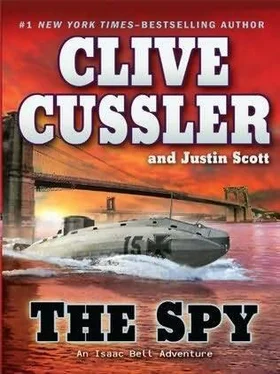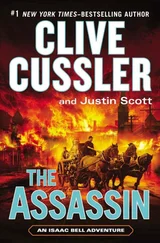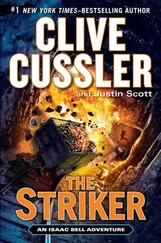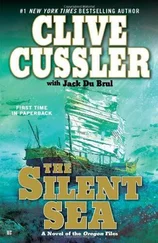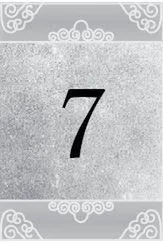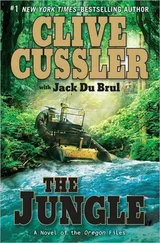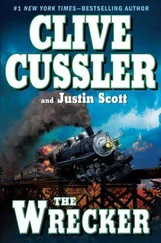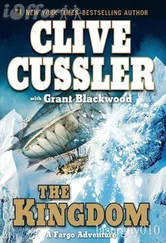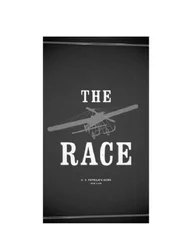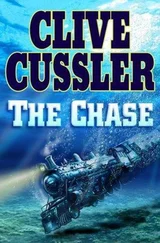“Last chance, Bell. Jump!”
Bell bought one more second with “Never!”
He launched in a desperate dive to clear the fence. Too low. He missed a telegraph pole by feet and a fence post by inches. But the top strand of barbed wire was leaping at his face. The speeding train’s slipstream slammed into him. The blast of air lifted his flying body over the wire. He hit the grass face-first like a base runner stealing second, and he tried to tuck arms and legs into a tight ball. He rolled, powerless to avoid any rock or boulder in his path. In the blur of motion there was suddenly something solid right in front of him, and he had no choice but to slam into it.
The shock jolted every fiber in his body. Pain and darkness clamped around his head. He was vaguely aware that his arms and legs had untucked and were flopping like a scarecrow’s as he continued rolling on the grass. He hadn’t the strength to gather them in again. The darkness deepened. After a while he had the vague impression that he had stopped moving. He heard a drum beat. The ground shook under him. Then the darkness closed in completely, and he lay absolutely still.
At some point the drums ceased. At another, he became aware that the darkness had lifted. His eyes were open, staring at a hazy sky. In his mind he saw a spinning field filled with sheep. His head hurt. The sun had moved an hour’s worth to the west. And when he sat up and looked around, he saw a flock of real sheep-unshorn woollies grazing peacefully, all but one a hundred yards away that was struggling to stand.
Bell rubbed his head, then he felt for broken bones and found none. He rose unsteadily and walked toward the sheep to see if he had injured it so badly that he would have to shoot it to put it out of its misery. But, as if inspired by his success, it managed to stand on all fours and limp painfully toward the flock. “Sorry, pardner,” said Bell. “Didn’t aim to run into you, but I’m glad I did.”
He went looking for his hat.
When he heard a train coming, he climbed up the embankment and planted himself in the middle of the tracks. He stood there, swaying on his feet, until the train stopped with the tip of its engine pilot pressing between his knees. A red-faced engineer stomped to the front of his locomotive and yelled, “Who the hell do you think you are?”
“Van Dorn agent,” Bell answered. “On my way to Napa Junction.”
“You think that makes you own the railroad?”
Bell unbuttoned the inner breast pocket of his grass-stained coat and presented the most compelling of the several railroad passes he carried. “In a manner of speaking, I do.” He staggered to the ladder that led to the cab and climbed aboard.
At Napa Junction, the stationmaster reported, “The English clergyman and his Chinese missionary took the train north to St. Helena.”
“When’s your train to St. Helena.?”
“Northbound leaves at three-oh-three.’”
“Wait.” Bell steadied himself on the counter. “What did you say?” Another field of round sheep was spinning in his head. “Clergyman?”
“Reverend J. L. Skelton.”
“Not a writer? A journalist?”
“When’s the last time you saw a newspaperman wearing one of them white collars?”
“And he went north?” Away from Mare Island.
“North.”
“Did he take the Chinese student with him?”
“I told you. He bought two tickets to Mount Helen.”
“Did you see them both board?”
“Saw them board. Saw the train leave the station. And I can report that it didn’t come back.”
“When’s your next train south?”
“Train to Vallejo just left.”
Bell looked around. “What are those tracks?” An electric catenary wire was supported over them. “Interurban?”
“Napa-Vallejo and Benicia Railroad,” the stationmaster answered, adding with a disdainful sniff, “the trolley.”
“When’s the next trolley to Vallejo?”
“No idea. I don’t talk to the competition.”
Bell gave the stationmaster his card and ten dollars. “If that reverend comes through here again, wire me care of the commandant of Mare Island.”
The stationmaster pocketed half a week’s salary, and said, “I suppose I’ve never seen you if the reverend asks?”
Bell gave him another ten dollars. “You took the words right out of my mouth.”
He was waiting at the Interurban tracks, head spinning, when a red, four-seat Stanley Steamer with yellow wheels glided by silently. It looked brand-new but for mud spattered on its brass headlamps.
“Hey!”
Bell ran after it. The driver stopped. When he peeled back his goggles, he looked like a schoolboy playing hooky. Bell guessed that he had “borrowed” his father’s car.
“I’ll bet you twenty bucks that thing can’t do a mile a minute.”
“You’ll lose.”
“It’s six miles to Vallejo. I’ll bet you twenty bucks you can’t get there in six minutes.”
Bell was losing the bet until, two miles from Vallejo, they came squealing around a bend in the road, and the driver stomped on his brakes. The road was blocked by a gang of men who had dug a trench across it to lay a culvert pipe. “Hey!” yelled the driver. “How in heck are we supposed to get to Vallejo?”
The foreman, seated in the shade of an umbrella, pointed at a cutoff they had just passed. “Over the hill.”
The driver looked at Bell. “That’s no fair. I can’t do sixty over a hill.”
“We’ll work out a handicap,” said Bell. “I think you’re going to win this race.”
The driver poured on the steam, and the Stanley climbed briskly for several hundred feet. They tore across a short plateau and climbed another hundred. At the crest, Bell saw a breathtaking vista. The town of Vallejo lay below, its grid pattern of streets, houses, and shops stopping at the blue waters of San Pablo Bay. To the right, Mare Island was marked by tall steel radio towers like those Bell had seen at the Washington Navy Yard. Ships lay alongside the island. In the distance, he saw columns of black smoke rising behind Point San Pablo, which divided San Francisco Bay from San Pablo Bay.
“Stop your auto,” said Bell.
“I’m losing time.”
Bell handed him twenty dollars. “You already won.”
A line of white battleships rounded the headland and steamed into view. He knew their silhouettes from the Henry Reutendahl paintings reproduced for months in Collier’s. The flagship, the three-funnel Connecticut, led the column, followed by Alabama, with two smoke funnels side by side, then the smaller Kersage, with two tall in-line funnels and stacked forward turrets, and Virginia taking up the rear.
“Wow!” exclaimed the kid at the wheel. “Say, where are they going? They’re supposed to anchor at the city.”
“Down there,” said Bell. “Mare Island for maintenance and supplies.”

THE KID DROPPED HIM on a street of tailors’ shops that catered to Navy officers.
“How much to replace my suit of clothes?”
“Those are mighty fine duds, mister. Fifty dollars if you want it fast.”
“A hundred,” said Bell, “if every man in your shop drops everything and it’s done for me in two hours.”
“Done! And we’ll get your hat cleaned free of charge.”
“I would like to use your washroom. And then I believe I would like to sit in a chair where I can close my eyes.”
In the mirror over the sink he saw a slight dilation of his pupils that told him he might have suffered a minor concussion. If that was all. “Thank you, Mr. Sheep.”
He washed his face, sat in a chair, and slept. An hour later he awakened to the rumbling of a seemingly endless line of wagons and trucks heading for Mare Island Pier. Every fourth truck had T. WHITMARK stenciled on the side. Ted was doing well feeding the sailors.
Читать дальше
